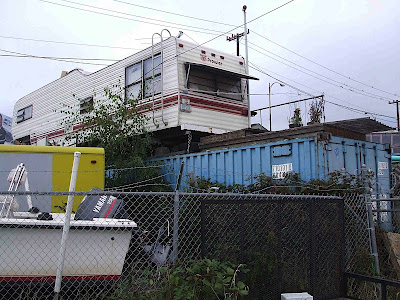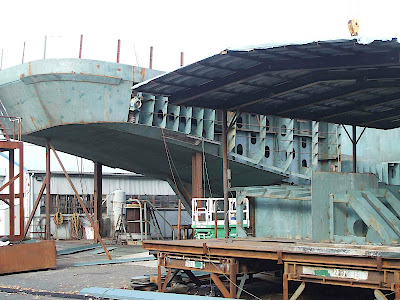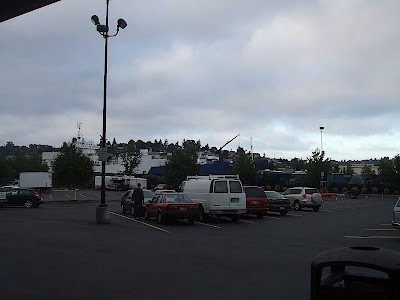There is a vision of our future that sees us better off than we are now, but "better off" does not mean superficial expressionism such as owning a house with larger dimensions, or two more cars than we own now. And "better off" does not mean a hippy/treehugger moral ascendance of no industry, no strategic security measures, and living off the land like Native Americans once did.
It is a "better off" that will come from creative destruction, as the norms of doing political business in the 20th century are pummeled to defeat by energy shortages, terrorist threats, illicit narcotics mafias, cybercrime, and political corruption. Every household, community, city or state that continues to operate as if they are in 1959, 1969, 1979, or 1989 will reap rewards best represented by words in the Bible's Apocalypse: Conquest, War, Famine, and Death.
If you long for conservative/traditional articulations such as Eisenhower, Nixon, Goldwater, or Reagan; you are poorly equipped for this future. If you are guided by 60's counterculture icons such as Silent Spring , Timothy Leary or militant black solidarity; you are poorly equipped for this future.
What will be needed to make a pleasant life in this new world is equipment. Lots of it, used with skill towards the attainable.
By equipment I mean what one typically imagines: construction, welding, engine repair, boats, airplanes and fire fighting gear. I also mean skilled people, clustered close enough together that they can easily walk to a central point to carry out some complex industrial task. And I also mean infrastructure such as sidewalks, roads and navigable waterways.
This "equipment" is the same old stuff of 1959, the key will be proactive, pragmatic, engaged, cooperative and intelligent communities utilizing this "equipment" towards local wealth and security. Whether you see this as communism or kulakism says more about you than the scenario. America's only notable intellectual tradition has been pragmatism, and the successful people in the near future are going to be doing exacly that -and it will be a messy convoluted mix of communism, entrepreneurism, legislative regulations, and laissez faire. Purist ideologues will be doing tricks in the alley for their rent and food money.
Obviously such a nuanced critical mass of equipment cannot be set up just anywhere, and if we free fall into an economic or political collapse its not likely anyone will be building up a place to fit this criteria. All the necessary ingredients need to be there before they're needed, before a collapse.
Which brings us finally to Example A of such a place. Ballard.
[map]/[wikipedia].
Ballard has a traditional merchant lined main street, view of Olympic Mountains, library branch, major hospital, paved bicycle trail that runs the entire east-west breadth of Seattle, one of the largest public beach parks in the city, and most of the Alaskan fishing fleet moors at the Fishermen's Terminal(where I once resided on a boat for one month before shoving off to Alaska).
All these add up to pleasantness and attractions for tourists, and in a post-collapse era these things will matter. But what will matter equally or more aren't what's typically pitched to tourists: The industrial operations along the ship canal, and Fred Meyer.
The industrial buildings along the full length of the ship canal, and extending inland bounded by 8th and 15 Ave NW east-west and the canal to NW 54th Street north-south, all add up to the crowning jewel of Ballard, the most crucial equipment for its superpower status.
A bit of nuance needs to be understood about industrial districts in general and the Ballard version. In America the trend for the last forty years is for industry to move as far away from houses as possible, and each industrial building has a wide swath of land surrounding it. Industrial districts are almost always un-walkable. No sidewalks or huge amounts of space between each business. In South Seattle to Tacoma is the bulk of industry in the region, and some of it closer in to Seattle has sidewalks and is walkable. But even the areas with sidewalks has an unwelcoming use of space for a person seriously considering walking to work.
Contrast this to Ballard's industrial operations, which have a sidewalk that runs right by their front door entrance, and nice houses, condos, and apartments immediately next door. This squishing of residence and big machinery industry together within the same city block is the special sauce in the Ballard recipe for greatness.
The rest of America, and even in most of Seattle, has pursued left and right wing agendas that destroyed the prospect for community wealth, strength and resilience in a lean post-collapse era.
From the right wing: businesses, driven by desire for cheapest land, have located in what was once farmland, as far from cities and urbanity as possible. This has built in a major point of stress and failure for their ability to weather economic depression. This anti-urbanism relies on cheap personal transportation for the workers. In the gas price hike of 2008 their were workers making $8 an hour spending their paychecks on gas. The industries will be the big losers, as workers are forced to quit work in a major fuel crisis. This sort of culture will be bankrupt and shut down.
From the left wing: seeing industrialism as inherently ugly, and wanting none of it in view of their homes -only wanting green parks and recreational facilities, an especially good example of this cognitive dissonance is the opposing placement of cell phone towers in their neighborhoods while being the main customers demanding cell coverage. Blame the ever increasing Nature-first ethic: the articulating of ecology as a 'subversive subject'— as a perspective that cuts against the grain of materialism, scientism, and the technologically engineered control of nature. This sort of culture will be powerless and ripe for exploitation and control by those who do embrace the technologically engineered control of nature.
Finally I add Ballard's Fred Meyer superstore to the mix that makes for a superpower community in the post-collapse era. Not only are industrial operations and houses squished together, but a store that has everything practical is squished in also. The neighborhood's paved bicycle trail even runs alongside the store. In post-60's America stores that offer the most have located away from the urban to the car-culture of suburbs. Most downtowns and true inner-city areas are seriously lacking in stores that stock useful stuff the middle class people need on a daily basis. This Fred Meyer has groceries, clothes (including Carhart), shoes, watch and jewelry, two expresso cafes, one sushi bar, deli, furniture, toys, hardware, plants and produce nursery, and even boat trailers.
While most articulate a post-collapse world with anti-consumerist rhetoric, lets be serious: we need stuff. When there's no convenient store to get it, we end up paying more in travel or other trouble to get it. And while "collapse" is being envisioned with extremes of depravity, the actual way our collapse may play out is like it is in 2009, a slow death of some aspects of culture, and a swing towards austerity, forever. In such a case, a practical and convenient store offering everything, accessible by bike ride or walk, will thrive by helping the customer base be thrifty.
"A thrifty industrious people emerged the winners" sounds like the opening lines of a cheesy 1950's textbook praising the ascendance of Protestants or Americans. Nope, its my closing lines describing Ballard, Superpower of the Future.

Ship overwhelming the view at small boardwalk park.

Break room at Icicle work yard seen through fence at same boardwalk park.

Leary Way

Restore Used Building Materials.

New condos

House next to industry.

House next to industry.

House trailer on top of Sealand container. Pic 1

House trailer on top of Sealand container. Pic 2

House trailer on top of Sealand container. Pic 3

Ballard Bridge

Mudflap Mermaids at the Divers Institute of Technology

Old diving bell at Divers Institute of Technology

Trident Seafoods Old Yard with M/V Independence

Western Tugboat Company

Dock Street Brokers in old Ballard

Electric scooter with homemade baskets and Asian script

Fred Meyer. Ballard.

View of ships from Fred Meyer entrance.
Further reading on the cities of the post-collapse future:
Security: Power To The People
BY: JOHN ROBB Wed Dec 19, 2007


No comments:
Post a Comment